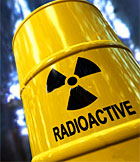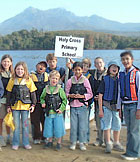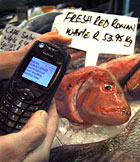 |
 |
 |
| |
|
 |
|
 |

 |

 |

 |
" We are the first generation with tools to understand changes in the Earth’s system caused by human activity, and the last with the opportunity to influence the course of many of the changes now rapidly under way"
Peter Vitousek, Stanford University 1997 |
|

 |
|
Welcome to the fourth edition of the DLIST Newsletter, this time dedicated to Earthnotes, a film festival in a box. Our collection of environmental documentaries has been travelling from town to town, where many old and new DLIST partners organised local festivals. Thanks to the enthusiasm and energy of everyone involved, many people and students around South Africa and Namibia were able to learn more about environmental problems and discuss solutions, making the DLIST network grow even bigger. Next year we want to include films in Portuguese and take them also to Angola. A big thank you to all the filmmakers, distributors, and festival organisers!
For this newsletter, we have invited environmental organisations, film producers and environmental experts who were involved in Earthnotes to write about some of most discussed topics during the festival. Read about nuclear waste in Namaqualand, SASSI’s appeal to us all to become more responsible seafood consumers, the Cape West Coast Biosphere Reserve, the power of documentaries, tips to reduce our waste and save water, wetlands in Angola, and deforestation in Namibia. Find out about our new Partner, the Garden Route Environmental Education Network, and check the latest discussions and new documents on DLIST. If you want to hear more about Earthnotes or have ideas for next year, write to us!
The newsletter presently goes to all registered DLIST users, as well as many people who may be new to the platform. If you've never heard of DLIST, you can find out more here. If you have suggestions for newsletter articles, please write to our team at admin@dlist-benguela.org.
Best regards
The DLIST-benguela Team
|
|
 |
 |

|
| IN THE NEWS |
|
The importance of documentaries
By Maria Terezinha Vaz, film producer
Documentaries are a growing form of communication that provides the kind of news and information that the main stream news and the media moguls have been hiding. In a time when 70% of all media worldwide is controlled by eight companies, the importance of independent documentaries is all the more evident in helping to educate people and promote much needed changes in our societies.
[ find out more ]
Precious Wetlands of Angola
With José Ngola, Namibe’s Provincial Directorate for Agriculture, Fisheries and Environment
Some of the local environmental documentaries shown at Earthnotes festivals have reminded us how important the wetlands of the region are for biodiversity conservation and sustainable livelihoods. While South Africa and Namibia are signatories to the Ramsar Convention, Angola is also giving steps to protect her incredibly rich water resources. Read more about the latest wetland policy and training developments in Angola, and find out what makes Saco dos Flamingos near Luanda so special.
[ find out more ]
Deforestation in Namibia
The rate at which deforestation is occurring in Namibia, coupled with the region’s already drought prone environment, can lead to alarming situations of desertification and food shortages. So where does the solution lie? Many believe that the main solution, among others, lies in changing the overall patterns of energy consumption, moving towards renewable energy sources that are community-based and reduce the use of less sustainable sources such as fossil fuels and firewood. Read some insights from recent debates on the DLIST discussion forum and during Earthnotes festivals.
[ find out more ]
|
 |
Where does your fish come from?
By Timony Siebert, WWF South Africa
How much do YOU know about your seafood? Have you ever wondered where your fish comes from and how it was caught, and do you know that some species are severely overfished? These questions were highlighted during the recent screening of ‘Farming the Seas’ as part of the Earthnotes film festival. Discerning consumers may have been shocked to learn that many traditional fisheries are threatened with collapse due to overfishing, unsustainable practices and habitat destruction. Yet we can make a difference by becoming more responsible seafood consumers. The Southern African Sustainable Seafood Initiative (SASSI) has condensed all information in a nifty fold-up wallet card which divides species according to how sustainable their stocks are. Next time you buy fish or dine out, remember to choose a species from the card’s Green List.
[ find out more ]
Open Day on the West Coast
By Melissa Baird, Cape West Coast Biosphere Reserve
On the 6th October 2007 The Cape West Coast Biosphere Reserve hosted its first open day at the West Coast Fossil Park. Stretching northward from Diep River in Cape Town, South Africa, to the Berg River, the Cape West Coast Biosphere Reserve was born from the recognition of the need to ensure appropriate development of the West Coast region. At the Open Day, people from the surrounding communities stopped by to enjoy local arts and crafts, music, and environmental films, and met representatives of the Cape West Coast Biosphere Reserve to learn more about what the biosphere means to them.
[ find out more ]
Getting inspired and wiser!
The power of image is unquestionable. Environmental documentaries sometimes paint a daunting picture of our planet, but some of them have the power to engage us, giving us hope and inspiration, and mobilising us to act. Some of the Earthnotes films have certainly made people talk and share ideas. In an effort to share the positive side of these discussions more widely, we have gathered thoughts that were raised and ideas for action. Too much waste and too little water? Take home some tips to recycle waste and to save our water.
[ find out more ]
|

|
| RECENT DISCUSSIONS |
|
Linking ICT with Poverty Alleviation – How can DLIST Contribute to Poverty Alleviation?
How can Information and Communication Technology (ICT) help alleviate poverty? Should we turn to the policies or seek more practical solutions, and how can DLIST help? Our DLIST members discuss the issue of poverty alleviation.
[ visit thread ]
Monopoly of Power Supply is the Enemy of the Alternative Source
DLIST users from East Africa discuss the relations between Government, major companies and civil servants in energy sources, supply and consumption. Are Government and private companies controlling the energy sector in Tanzania, causing high electricity prices and lack of development of alternative source?
[ visit thread ]
Man Made Deforestation
The issue of deforestation in Namibia is discussed—what has caused the increase in deforestation and how can it be prevented?
[ visit thread ]
Over-Utilisation of Resources
The Minister of Environmental Affairs and Tourism in South Africa has called for a suspension on the harvesting of the over exploited abalone in South African waters. How and why have we been depleting our fish stocks to such an extent that it has lead the government to take such drastic measures?
[ visit thread ]
Aquaculture in Africa: Community Based Aquaculture Projects
DLISTers from coastal communities and organizations discuss the pros and cons of Aquaculture development in Southern Africa.
[ visit thread ]
Twisting Arms in Favour of Environmental Socialism
Members discuss how influential figures can play a part in spreading the word of environmental stewardship.
[ visit thread ]
How About and Environmental Festival in your Town
Community members that hosted the Earthnotes Environmental film festival in their areas share with us the positive responses they received from the Cape west coast to Madagascar.
[ visit thread ] and [ visit thread ]
|

|
| NEW IN THE DOCUMENT LIBRARY |
|
- Southern African Sustainable Seafood Initiative (SASSI) Pocket Guide
[ see details ]
- Southern African Sustainable Seafood Initiative (SASSI) Booklet
[ see details ]
- The Current Status of Spatial Policy Planning in the Western Cape (in the Western Cape Provincial Spatial Development Framework)
[ see details ]
- Nuclear Energy Policy and Strategy for the Republic of South Africa (July 2007) - Draft for Public Comment
[ see details ]
- City of Cape Town Community Waste Drop Off Facilities
[ see details ]
- Collect Waste for Recycling Leaflet
[ see details ]
- Draft Waste Management Bill (2006, South Africa)
[ see details ]
- Information and Communication Technologies (ICTs) and Poverty Reduction in Sub Saharan Africa - A learning Study Synthesis
[ see details ]
- Country Report: Angola In: Environmental Impact Assessment in Southern Africa
[ see details ]
- From Grain Pits to Silos-Indigenous Knowledge Series
[ see details ]
-
|
| ^ top |
|
|

 |
| |
| |
|
 |
|
| |
|
|
|
|